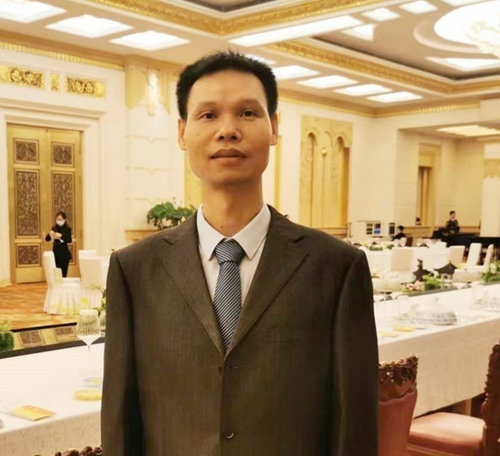Reviewing major milestones in the relations of the two countries, he said that January 18, 1950, was a turning point when China became the first country to recognize and establish diplomatic relations with Vietnam, laying the foundation for their robust cooperation. Over the decades, leaders such as President Ho Chi Minh and Chairman Mao Zedong forged a relationship that continues to thrive.
In the late 20th century, both nations adopted the "the 16-word motto of “friendly neighborliness, comprehensive cooperation, durable stability and looking toward the future” and the four-good spirit of “good neighbors, good friends, good comrades and good partners.” The partnership reached new heights in 2008 with the establishment of a comprehensive strategic cooperative partnership, driving progress across multiple fields, he noted.
    |
 |
|
Chinese journalist Qiao Jun, an expert on Vietnam at the China Media Group |
Qiao said that 2023 marked another leap forward. Leaders from both sides outlined a "six major orientations" to deepen ties, focusing on boosting political trust, strengthening defense-security cooperation, expanding practical collaboration, building stronger social foundations, enhancing multilateral coordination, and effectively managing and settling disagreements.
The two nations also committed to developing a Vietnam-China Community with a shared future that carries strategic significance, opening a new chapter in their relationship.
Amid global uncertainty, Vietnam-China relations remain stable and forward-looking, thanks to the strategic vision of their top leaders. High-level visits and regular exchanges have strengthened political trust, ensuring bilateral ties stay on the right track. Since 2012, Party-to-Party exchanges have played a pivotal role in deepening cooperation, underpinning progress in all areas.
The Chinese journalist underlined that cultural and people-to-people exchanges between the two countries have flourished, reflecting the close historical and geographical ties between the two countries. Forums, festivals, and student exchange programs have fostered mutual understanding and goodwill. Chinese literature and TV dramas enjoy wide popularity in Vietnam, while thousands of Vietnamese students study in China and vice versa.
These exchanges are creating strong grassroots connections, building a solid foundation for bilateral cooperation, he said.
He cites data from the Vietnam National Authority of Tourism showing that the number of Chinese tourists visiting Vietnam in 2024 reached 3.7 million, marking a staggering 214.4% increase compared to 2023.
China is Vietnam’s largest trading partner, while Vietnam is China’s top partner in ASEAN and its fourth-largest globally. Bilateral trade has consistently exceeded USD 200 billion annually.
Infrastructure connectivity is another bright spot, with major projects like the Lao Cai - Hanoi - Hai Phong, Lang Son-Hanoi, and Mong Cai - Ha Long - Hanoi railways advancing steadily, promising stronger connections between the two countries, he said.
Emerging opportunities in clean energy, the digital economy, and green development also signal vast potential for future collaboration, he added.
As both nations pursue modernization and economic development, Qiao highlighted the shared opportunity to deepen cooperation in the years ahead.
The 75th anniversary of diplomatic ties and the “Year of Vietnam-China Humanistic Exchange” in 2025 offer a unique chance to strengthen bilateral partnership and deliver tangible benefits to both peoples, the Chinese expert underlined.
Source: VNA